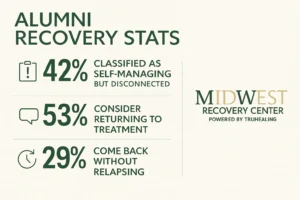You’ve been sober for a while now.
Maybe it’s been a few years. Maybe more. You did the work, made the changes, stuck with the program. You built something. And for a while, it worked. Really worked.
But lately, things have shifted.
Not in a loud, catastrophic way. No relapse. No overdose. Just… something deeper. A quiet disconnection. A heaviness. A sense that the spark you had in early recovery is missing—and has been for a while.
You’re not using, but you’re not thriving either. You’re managing.
And the question you’ve been carrying quietly in your mind—maybe for months now—is this: What if I went back to treatment?
And just as quickly, another voice chimes in: What would that mean? That I failed? That I’m starting all over again? That everything I’ve already done didn’t count?
Let’s be clear—coming back to opioid addiction treatment isn’t going backward. It’s moving forward, differently.
Sobriety Isn’t the Finish Line—It’s the Starting Point
For many of us, getting clean felt like climbing a mountain. The early days of recovery were all-consuming. The wins were big, and the relief was huge. Just making it through a day sober felt like an achievement.
But over time, the intensity of that early phase fades. The high of healing quiets. And in its place, real life settles in.
You handle work, show up for your family, keep your routines. You’re living clean. But sometimes, it feels like that’s all you’re doing—living clean, not really living.
That’s not failure. That’s the emotional plateau that many long-term alumni hit. It’s not a sign that your recovery is broken. It’s a signal that your soul might need something more.
That Disconnected Feeling? It’s Real—and You’re Not Alone
This is the part of recovery we don’t talk about enough: the flatness.
That space where nothing’s technically wrong, but nothing feels deeply right either. You go through your day, check the boxes, maybe even sponsor someone. But something inside you feels hollow.
You feel guilty for feeling this way.
You think you should be grateful.
You think maybe this is just adulthood.
You wonder if this is as good as it gets.
Here’s the truth: it’s not.
Programs like the one at Midwest Recovery Center in Toledo aren’t just for people in crisis. They’re for people like you—people who’ve been walking the path, but feel like they’ve drifted off course emotionally or spiritually.
You’re not broken. You’re just tired. And you deserve care for that too.
Coming Back to Treatment Isn’t Resetting—It’s Reconnecting
The idea of going back to treatment can feel humiliating if you think of it as starting over.
But this isn’t day one. You’re not the same person who walked in the first time scared, skeptical, or full of shame.
You’re returning with experience, insight, and clarity you didn’t have before. You’ve done the work. You know the language. You know what helped—and what didn’t.
This time, you’re not walking in to be “fixed.” You’re coming in to be supported—to go deeper, to address things that maybe weren’t on the table back then. And that’s not a restart. That’s an evolution.
At Midwest Recovery, returning alumni are met with respect, not judgment. You don’t have to explain your way back through the door. You just have to walk in.

Opioid Recovery Isn’t Just About Not Using—It’s About Living Well
There comes a point in long-term recovery where staying clean isn’t the hard part anymore—but feeling alive is.
You don’t think about using. But you also don’t feel connected.
You’re not craving. But you’re not really inspired either.
You’re grateful. But you’re not content.
This is emotional sobriety.
And it’s just as important as physical sobriety.
Coming back to treatment might mean finally working on the grief you never faced in early recovery. It might mean dealing with burnout. Or depression. Or trauma that’s been quietly running in the background.
It might mean finally saying, “I’m sober. But I’m not okay.”
That doesn’t make you weak. It makes you honest.
You Don’t Need a Crisis to Justify Care
One of the biggest reasons alumni don’t return to treatment is this idea that it has to be dramatic to be valid.
But you don’t need to be using again. You don’t need to have relapsed. You don’t need to be on the verge of collapse.
You just need to want something different.
At our center, we see alumni every week who come back not because they failed—but because they outgrew the tools they were using. Or because they realized maintenance isn’t enough if you’re emotionally running on empty.
Whether you’re near Maumee, Perrysburg,Oregon, Ohio or Lambertville, Michigan, we offer outpatient support, alumni groups, and one-on-one therapy options for people who need a space to reset—not rebuild from scratch.
Growth in Recovery Isn’t Linear—It’s Layered
You’ve heard this before, but it bears repeating: healing isn’t a straight line.
There are layers to this work. You uncover some in year one. Others in year five. Some show up uninvited when you lose a loved one, change jobs, become a parent, or hit a wall you didn’t know was coming.
Recovery deepens when you make space for new layers—not when you pretend you’re past them.
Coming back to treatment is one of the bravest ways to say: I’m still in this. I still matter. I want more.
You’re Not Going Back. You’re Going Deeper.
You’ve already proven you can get sober. Now maybe it’s time to prove—to yourself, not anyone else—that you’re allowed to want something richer than just staying clean.
You’re allowed to want meaning. Connection. Peace. Joy.
You’re allowed to come back to treatment not because you’re broken—but because you know what healing feels like, and you’re ready for more of it.
We’re here when you are.
Frequently Asked Questions for Alumni Thinking About Returning to Treatment
Is returning to treatment a sign that my recovery failed?
Not at all. It’s a sign that your recovery is evolving. Many alumni return to treatment for support during life transitions, burnout, grief, or spiritual disconnection. It’s a move forward—not a reset.
What kind of programs do you offer for returning alumni?
We offer alumni groups, outpatient counseling, and personalized short-term support for long-term recovery maintenance. It’s flexible, private, and designed for your current season of life.
Do I have to be using again to qualify?
No. In fact, most returning alumni are still sober. They’re just struggling emotionally, feeling stuck, or wanting a space to realign. You don’t need a relapse to deserve support.
Will I be treated like a new client?
No. We know what you’ve already done. We respect your history. We’ll listen to where you are now and build something from there.
What if I’m embarrassed to come back?
You’re not alone. That fear is common—but we don’t see your return as failure. We see it as strength. When you’re ready, we’re here—no questions, no shame.
You’re not starting over. You’re stepping forward.
Call (888) 657-0858 or visit Midwest Recovery Center’s opioid addiction treatment program in Toledo, Ohio to reconnect with a team that sees who you are—and who you’re still becoming.


























